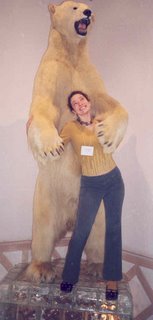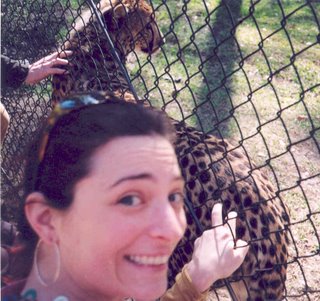I took
this article from an online forum, and have pasted my response below the ***s.
Future of meat is in the lab not on the farm, researchers say
Last Updated Mon, 27 Mar 2006 14:06:12 EST
Scientists who are growing animal muscle tissue in the lab are hoping to develop an industrial version that could cultivate beef, pork or chicken from a few muscle cells.
Instead of being cut from a farm animal, the meat would be grown in incubators from a few starter cells, a growth medium and some hormones to get the cells to divide.
The first attempts have been small in scale, but scientists are looking forward to the day when meat could be grown in industrial bioreactors or even in a device sitting on a kitchen counter.
"Right now, the scale that's being used in the research is about one-half of a litre for ... the incubator the muscle is grown in," said University of Maryland researcher Jason Matheny. He says a device similar to a bread maker could one day be used to manufacture meat in the home.
Matheny said muscle produced in an incubator could have reduced fat content, and the process would do away with problems such as bacterial contamination and mad cow disease.
While he hasn't tasted engineered meat himself, Matheny says others have.
"It has the taste and texture resembling the ground meat products that are already available," such as hamburger or chicken nuggets, he says.
"Producing a steak or ... a whole chicken breast is a much more difficult task, technically," said Matheny.
Researchers in the Netherlands have grown mouse meat and are now working on pork. Australian scientists served grown frog muscle tissue with apple brandy sauce at an exhibition in France in 2003. They said the meat tasted like jelly on cloth.
American researchers, funded by NASA, grew goldfish meat in 2001 as part of an experiment to see if fish could be grown to feed astronauts on long space missions. While the idea of growing meat for space travel is fairly common in science fiction novels, NASA has since pulled funding for lab-grown meat.
Vladimir Mironov, a tissue engineer at the Medical University of South Carolina, says NASA's decision cut off an important source of funding for his work.
Mironov says producing cultivated meat could be difficult to achieve and expensive in the short term. People would have to pay more for cultured meat than for the genuine article.
***************************************************
I thought this was a really great question. I am in veterinary school, so I forwarded the article to several of my professors to get a more "professional" opinion. Here's what they say:
From the Ethicist (trained as a lawyer):
Well, there is surely a "yuck" factor. I prefer to live a more natural life ... so this is unappealing to me. As for the ethics, some of the Center students thought it an ethical problem, others thought it not at all troubling from that vantage point. My own take is that it is NOT an ethical problem at the level of harming living beings unnecessarily. But because I'd so rather live a simpler life, I'd not purchase this kind of product myself.
So think my response is not unlike yours -- aesthetically, I don't want to go there. But my choice isn't based on a strong ethical instinct that this problem is like some of the other ethics-based issues that arise when one intentionally kills an animal for sustenance that one can get in another, less troubling manner.
From the Physiologist (a Ph D):
What comes to my mind is that I will most likely be pushing dasies before this idea sees the light of day (commercially). As long as the protein they generate has the appropriate number of essential amino acids, I see few limitations. The digestive tract doesn't care where the protein came from, it is only concerned with digesting it, and absorbing the generated small peptides and amino acids.
From the Anatomist (a DVM):
I am all for technology. Few years ago, there was an attempt to introduce chicken MYO-D gene into potato, and harvest chicken muscle meat. That did not happen. This new attempt also indicates the limitations faced by molecular biologists, who think they can redesign the world, but are limited by their knowledge of anatomy and physiology. Muscle requires constant exercise against load to develop and taste like meat! Putting muscle cells in a culture can't grow real meaty muscle. Anyway, we are already suffering from the ill effects of molecular biologists teaching medical students (they get grants, they get the jobs), soon, medical
doctors will be less well educated than nurses.
From an international wildlife vet (DVM):
Sounds like something from Star Trek no? I guess I feel better about this than the cloned pigs with Omega 3 fatty acids inserted. At least it would be sparing the animals, that is if, far into the future, it replaces traditional industrial agriculture. Probably worth a shot, I wouldn't be surprised if this does actually move forward as a way to make protein. Very interesting article. Thanks for sharing it with me.
From the conservationist/wildlife vet (DVM):
This has been coming for a LONG time, I first saw it discussed almost 40 years ago.
On the one hand, the cells have to come from some place initially -- but the animal of origin isn't necessarily killed, also the number of acres dedicated to agric. animals and their food, and water used could be much reduced...so that's a good thing (right?).
On the other hand, if it's going to involve lots of hormones, chemicals and plastic and be an "industry" that is a big net user of resources and a polluter, I'd certainly be worried. Then of course, don't we all feed as though people in developped countries are already FAR to disconnected from the natural world? As with many issues I feel pretty underinformed! These are just quick thoughts, but it would make a fabulous forum for discussion. Thanks for pointing this out to me.
Personally, I think what the anatomist and the conservationist have to say are really poignant. That is, that meat has to be exercised IN AN ANIMAL for it to taste like meat. Also that of course this method decreases the "inhumanity" of raising meat, but that as just another industry, there will be wastes inherent--environmental concerns like plastic consumed, and monetary/energy concerns when it comes to the price of "raising meat" in the laboratory. Which is the lesser of two evils? I am inclined to say that calories are the most efficient energy to burn. Growing food for animals to eat to make meat for us to eat takes (or, rather, can take) very little fossil fuel, and the resource is eternally renewable. However if we move to growing meat in labs, we will be using more fossil fuels to fuel the electricity of the place, we will be using more plastics and creating more enviro-unfriendly waste, and so on. In the meantime, I remain a vegetarian.












